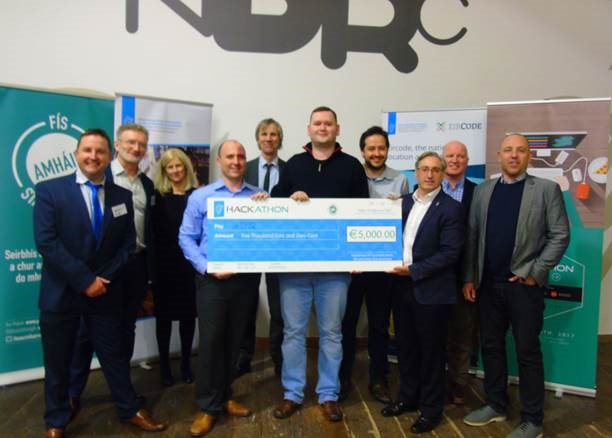Announcing HackYourWayDay Winners
16 February 2017The judges have deliberated and voted and the results are in. We are pleased to say that the x-Gov Eircodes Hackathon held on February 10th was a great success and congratulations to the three winners.
In case you missed it, the theme of HackYourWayDay which took place in the NDRC, Dublin 8 last Friday was on how to use Eircoded location open data to solve real problems that citizens have.
Organised by the Department of Communications, Climate Action & Environment (in conjunction with the HSE) the question at the heart of the day was… How can we use the open data we have (health, local gov., transport, education etc.), in conjunction with the location (eircode, geocode) of services people use, to solve problems that citizens experience?
The hackathon explored the benefits of Government datasets and the use of Eircodes by inviting creative minds, technologists, designers and innovators to come together and find ways to make it easier for people to locate and interact with Government services. The hackathon featured open datasets for Eircoded health and local government services as well as other datasets such as transport data from the NTA, boundary data from the OSi, and other datasets such as hospital and school locations from the national open data portal data.gov.ie.
Over 100 people registered on the day which included public servants, citizens, researchers, students, developers, coders and engineers. Attending a hackathon was a new departure for the Open Data Team and it was great to see open data from the portal in use.
In addition to the Department of Communication, Climate Action & Environment, the following public bodies also supported the hackathon – the Department of Public Expenditure & Reform, the HSE, eHealth Ireland, Smart Dublin, Fingal Co. Co., Roscommon Co. Co., the Local Government Management Agency, NDRC, National Transport Authority (NTA), Dublin City University, Ordinance Survey Ireland, Rehab Group and SEAI.
Some of the key outcomes of the day were:
- gaining a deeper understanding of problems relating to finding services, finding the places delivering those services, getting to those places and solving real problems for real people
- finding new and interesting ways to use open data we collect as a nation
- finding new and interesting ways to use Eircodes to solve problems and new solutions to problem that citizens have
- promoting the open data portal and the use of open data
A big thank you to the judges who had a very difficult job in choosing the three ultimate winners (from a total of 14 proposals submitted) - Peter Crowley (Digital Entrepreneur), Paul Mc Sweeney (COO- Capita), Fran Thompson (Delivery Director – eHealth Programme) & the Chair, Hilary Murphy Fagan (CEO of the National Shared Service Office).
And now for the winners
1st Prize (€5,000) went to the GDQ Team. Paul, Francisco & Séamus (pictured below) produced the Geographic Desirability Quotient (GDQ) to help users choose a place to live. The GDQ allows the user to set up the profile of their family, applies weightings to various facilities or amenities based on the profile and uses an algorithm to produce a ‘heat map’ of the most desirable places to live tailored the particular needs of that family.
2nd Prize (€3,000 )
And finally the 3rd Prize (€1,000) went to Michael Kelly who presented two separate solutions. The first was an enhanced version of the Eircode Finder that uses publicly available Eircoded data to map all the services nearby that a user might need in an emergency. The second application obtained data from the online property websites, combined with publicly available open data such as schools, medical facilities and transport links etc., thereby allowing the house-hunter to view various layers of mapped information in the locality of that particular house. This enabled the house hunter to identify localities that provided services to meet their needs while balancing the cost of buying/renting accommodation in that area.
The prize money was sponsored by the Department of Communications, Climate Action and Environment.

Pictures above are the overall winners, the GDQ Team with the organisers, Michael Murray, HSE and Ben King, DCCAE (sponsor), members of the judging panel and Gar Mac Críosta (facilitator).

 Derilinx
Derilinx